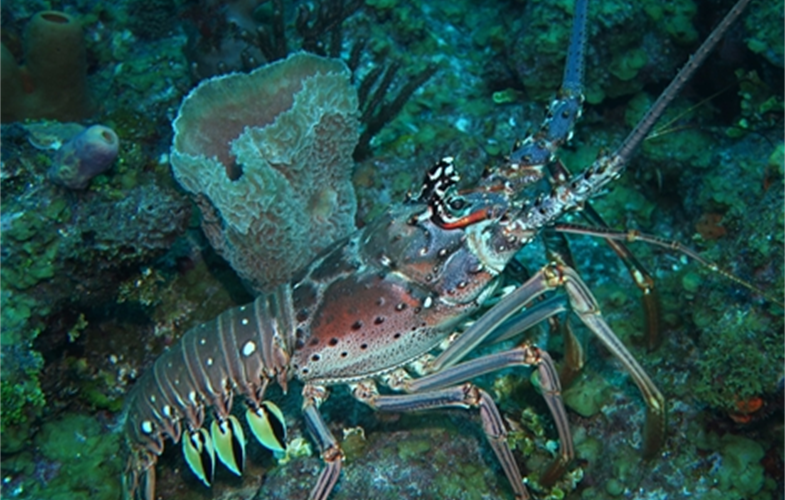 A spiny lobster in the waters of Belize. CREDIT: A. Tewfik/WCS
A spiny lobster in the waters of Belize. CREDIT: A. Tewfik/WCS
BELIZE CITY , BELIZE | APRIL 03, 2019 – The government of Belize has approved “The Expansion of Fisheries Replenishment (No-Take) Zones,” which will increase the total area of Belize’s protected waters from 4.5 percent to 11.6 percent, according to WCS (Wildlife Conservation Society). In this expansion, Belize also establishes its first protected area within its Exclusive Economic Zone, known as the Corona Reef due to its extensive coral reef complex.
The expansion is in the deep-sea area of Belize, with depths ranging from 200 to 3000 meters, which includes some of the most underrepresented habitats in the current marine protected areas (MPAs) system of Belize.
Studies show that the deep-sea area of Belize serves as an important habitat for deep-slope snapper species and bottom-dwelling (demersal) species.
Expansion of replenishment zones are essential for enhancing the viability and long-term sustainability of Belize’s marine resources for coastal communities and tourism industries, particularly as the country is faced with impacts of climate change.
It is a crucial step for Belize in meeting the aspirations of its development plans including Belize Horizon 2030 and the Growth and Sustainable Development Strategy. It will also help Belize to meet its international commitments under the United Nation’s Sustainable Development Goals (SDG), the Food and Agriculture Organization (FAO) Guidelines for Small-Scale Fisheries, the Convention on International Trade of Endangered Species (CITES), and the United Nations Convention on Biological Diversity. Further, this expansion will help to maintain the outstanding universal value of the Belize Barrier Reef Reserve System UNESCO World Heritage Site.
Extensive consultations with stakeholders resulted in the generation of validated and supported areas for designation as fisheries replenishment zones, which were identified through a scientific process led by the technical experts of the Fisheries Department, local and international scientific partners. The Belizean commercial fishers, particularly those who access deep-sea resources, were vital for this process and we praise their commitment the initiative, along with the local sports fishers.
The fisheries replenishment zones will protect important habitats and biological functions, such as reproduction, in order to prevent overexploitation of Belize’s fishery resources.
WCS Belize played a key role in identifying the newly created no-take areas, specifically through survey and monitoring work and in the preparation of technical documents with geographic descriptions and boundaries of the replenishment zones. WCS researchers also worked closely with both the Fisheries Department and with coastal communities and stakeholders in support of the recently announced decision.
In welcoming this major announcement, WCS’s Assistant Country Director, Ralna Lewis noted: “Securing these critical habitats demonstrates our government’s commitment to ensure traditional livelihoods are maintained, and is a step in the right direction towards enforcing Belize’s waters so as to combat and deter illegal fishing.”
“This is fantastic news for both the fish and the fishers in Belize,” said Jason Patlis, Executive Director for WCS Global Marine Conservation. “Today’s achievement more than doubles the no-take areas within the country’s territorial waters, and adds critical no-take areas to the deeper offshore waters of Belize. These protected areas will ensure sustainable and economically valuable fisheries for the long-term. Belize serves as a model for the world in sustainable fisheries management.”
WCS has worked in Belize for more than 30 years providing technical and scientific support to the government on a wide range of conservation initiatives and challenges, much of it coordinated through the WCS-managed Glover’s Reef Marine Research Station.
WCS’s work in Belize was generously supported by the Oak Foundation, The Summit Foundation, Oceans 5, Mesoamerican Reef Fund, the UK Government's Darwin Initiative, and a grant under the WCS MPA Fund.